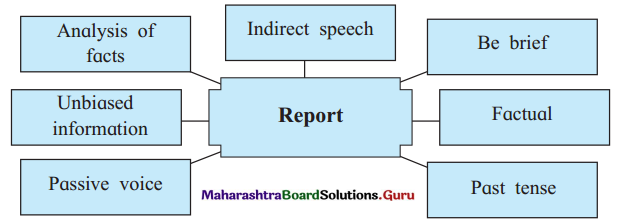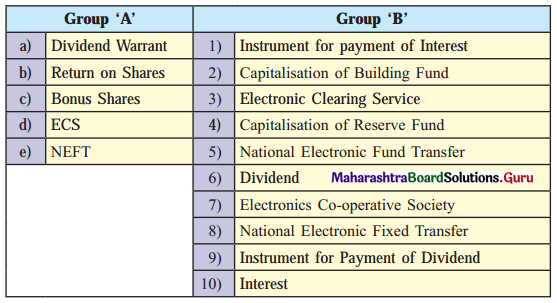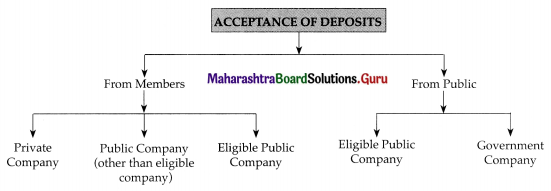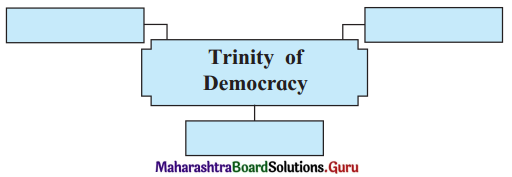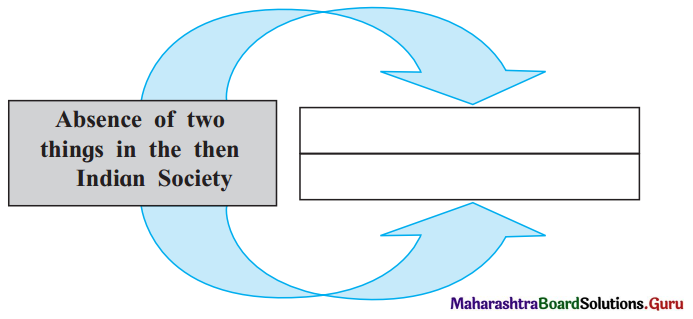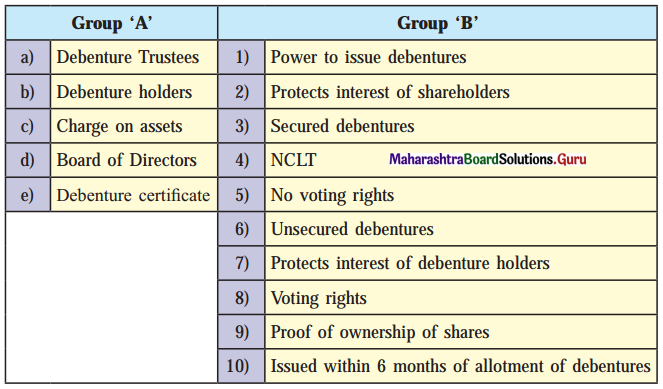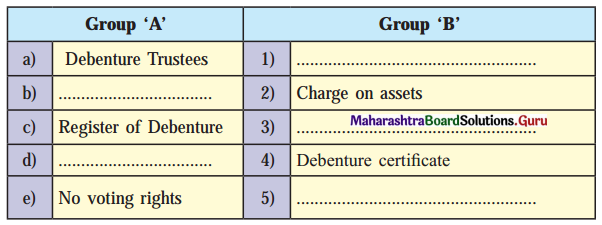Balbharti Yuvakbharati English 11th Digest Chapter 2.1 Cherry Tree Notes, Textbook Exercise Important Questions and Answers.
Maharashtra State Board Class 11 English Yuvakbharati Solutions Chapter 2.1 Cherry Tree
11th English Digest Chapter 2.1 Cherry Tree Textbook Questions and Answers
Question 1.
Trees are revered because –
Answer:
- They give us joy.
- They look beautiful with their lush green leaves that soothe our eyes.
- They clear the air by providing oxygen for us to survive and by taking away carbon dioxide to prevent pollution.
- They provide us food and many useful things.
- They provide habitat and food for birds and insects.
![]()
Question 2.
Column ‘A’ shows your involvement in growing a tree, as well as the stages in the life of a tree. Column ‘B’ shows the feelings you experience at all the stages. Match them appropriately.
| Column ‘A’ | Column ‘B’ |
| 1. You planted a sapling. | (a) Gave you a feeling of joy to see the promising future. |
| 2. You watered the plant. | (b) The new experience brought excitement to you. |
| 3. You saw the shoot for the first time. | (c) You were happy and satisfied because you experienced what you had often heard, that small beginnings can lead to great achievements. |
| 4. You fenced the plant. | (d) The colour, symbolizing life, gave you a feeling of hope. |
| 5. The plant gradually saw lush green leaves grow on it. | (e) You wanted to make a humble beginning. |
| 6. The tree had buds too. | (f) Your motive was to protect it. |
| 7. Birds made a nest on the tree which was fully grown and laden with flowers. | (g) You cared for it. |
Answer:
| Column ‘A’ | Column ‘B’ |
| 1. You planted a sapling. | (e) You wanted to make a humble beginning. |
| 2. You watered the plant. | (f) Your motive was to protect it. |
| 3. You saw the shoot for the first time. | (a) Gave you a feeling of joy to see the promising future. |
| 4. You fenced the plant. | (g) You cared for it. |
| 5. The plant gradually saw lush green leaves grow on it. | (d) The colour, symbolizing life, gave you a feeling of hope. |
| 6. The tree had buds too. | (b) The new experience brought excitement to you. |
| 7. Birds made a nest on the tree which was fully grown and laden with flowers. | (c) You were happy and satisfied because you experienced what you had often heard, that small beginnings can lead to great achievements. |
![]()
(A1)
(i) Find proofs from the poem for the following:
Question (a)
The poet has mentioned different seasons.
Answer:
(a) “And suddenly that summer…”
(b) “Next spring”.
Question (b)
The poet’s minute observations of the steady growth of the cherry tree.
Answer:
(a) “I found a tree had come to stay.
It was very small, five months child,
Lost in the tall grass running wild.”
(b) “Next spring I watched three new shoots grow.
The young tree struggle, upward thrust.
Its arms in a fresh fierce lust For light and air and sun”.
(c) “I could only wait, as one
Who watched, wandering, while Time and the rain
Made a miracle from green growing pain….”
Question (c)
The colour imagery in the poem.
Answer:
(a) ‘Green’ colour used in the poem quite often and it represents ‘life’.
(b) ‘Pink’ colour used to show the tenderness, fragility of the berries.
(c) ‘Blue’ colour used for the sky as it represents the clear sky which the poet could see through the gap of the leaves of the cherry tree.
Question (d)
The struggle of the cherry tree for survival.
Answer:
(a) “It was very small, five months child,
Lost in the small grass, running wild”.
(b) “But cherries have a way of growing,
Though no one’s caring very much or knowing”.
(c) “Goats ate the leaves, the grass cutter scyth0e
Split it apart and a monsoon blight
Shrivelled the slender stem…Even so,”
All these dangers were handled by the plant boldly since it had the urge to live.
(d) “The young tree struggle, upward thrust
Its arms in a fresh fierce lust
For light and air and sun”
The young tree refused to accept defeat and continued its struggle for survival in order to get the basic necessities of light, air and sun needed for its growth.
![]()
(ii) State whether the following statements are True or False. Correct the false statements by finding evidence from the poem to support your remark.
Question (a)
The cherry tree did not take long to grow.
Answer:
False. The cherry tree took eight years to grow into a six-feet high full-grown, fruit-bearing tree.
Question (b)
Birds and insects were benefited from the tree.
Answer:
True
Question (c)
The poet was exalted at the sight of the cherry tree.
Answer:
True
Question (d)
The poem has an underlying message about the importance of trees.
Answer:
False. The underlying message in this poem is not about the importance of trees. It mainly stresses on the struggle against adversities of life and how dedication and desire to survive can help any living object to come out of it.
Question (e)
The poet repents planting the cherry tree.
Answer:
False. The poet actually enjoys watching the magnificent cherry tree and takes pride in being the owner who has decided to sow the seed of this cherry tree.
![]()
3. Discuss the reasons/consequences/effects.
Question (a)
The life of the cherry tree was threatened.
Answer:
The cherry tree was so small initially that it was lost among the tall, wild grasses all around it. The threats in its life were the goats who ate its leaves, the grass cutter’s scythe that could split it apart and its tender stem had to fight the heavy monsoon. Moreover, no special attention or care was provided for it. But it was a fighter who could face all these threats boldly
Question (b)
The cherry blossomed.
Answer:
In spite of not getting any special care, the cherry tree, just by its urge to survive, could raise its head, fought all the odds in its life, came out successfully to nurture itself with the basic necessities for its growth, the light, the rain and sun. With the passage of time, its hard work bore fruits and it became a six-feet high full-grown tree which happily blossomed with fruits.
Question (iii)
A small thought, put in action, led to a great achievement. Pick out the lines from the beginning and end of the poem and explain their significance.
Answer:
(i) “Must have a tree of my own” I said.
The poet just wanted to be the sole owner of a tree and just with this simple thought in his mind he sowed the cherry seed. It is just a passing idea of his mind which he easily forgot. But the cherry seed had the potential to grow in spite of not having proper care and lots of threats on its onward journey in life. It was a winner all the way to grow into a magnificent fruit-bearing tree as it was dedicated to fight the odds.
(ii) The lines at the end of the poem, “Yes, I! – praised Night and Stars and trees. That small, the cherry, grown by me” express the pride of the poet who takes the credit for creating such a beautiful life. He has, no hesitation to accept that the cherry tree has struggled hard to come to this stage. But, at the same time, he is excited that the process has been started by him and the result is unbelievable.
(A3)
Question (i)
The cherry tree has inspired the poet to compose the poem. Such poems, describing Nature or aspects of Nature are called ‘Nature poems’. Find out some expressions from the poem that bring out the elements of beauty of Nature.
Answer:
1. “I could scarcely believe it – a berry,
Ripened and jeweled in the sun…”
2. “……. there were blossoms small
Pink, fragile, quick to fall…”
3. “Looking up through leaves… each bloom”.
4. “…the sun sank…crickets…”
![]()
Question (ii)
Find out an example of climax from the extract and explain it.
Answer:
“Pink, fragile, quick to fall”
They move from healthy to delicate
This figure of speech is called Climax where successive words, phrases, sentences are arranged in ascending order of importance. Here, the cherry blossom turns pink, ripens and is ready to be picked.
Question (a)
Alliteration:
Answer:
- “Shrivelled the slender stem…” sound of ‘s’ is repeated.
- “Its arms in a fresh fierce lust…” sound of ‘f is repeated.
- “Made a miracle from green growing pain…” sounds of‘m’ and ‘g’ are repeated.
- “… at the finches as they flew/And flitted through…” sound of‘f is repeated.
- “the sun sank/swiftly…” Sound of ‘s’ is repeated.
- “who watched, wondering, while time…” sound of‘w’ is repeated.
Question (b)
Antithesis:
Answer:
1. “…. but cherries have a way of growing,
Though no one’s caring very much or knowing”.
– Two opposite ideas of the steady growth of the tree in spite of not having much care and even knowledge of its presence, are placed side by side.
2. “Came back thinner, rather poor,
But richer by a cherry tree at my door”.
– Two opposite ideas of having poor condition of health but feeling rich at the sight of the cherry tree, are placed side by side.
Question (c)
Personification:
Answer:
1. “A tree had come to stay”
– The tree has been personified by giving it the human quality of coming to stay.
2. “The grass cutter scythe split it apart”
– The grass cutter scythe is personified.
3. “a monsoon blight shrivelled…”
– Monsoon is personified.
4. “The young tree struggle”
– The young tree is personified by giving it the human quality of struggling.
5. “the sleepiest breeze”
The breeze is personified.
6. “singing crickets”
– Crickets are personified.
7. “The young tree … thrust/its arms in a fresh fierce lust”
– The young tree is personified as it expresses its ‘lust’ like a human being.
![]()
(A5)
Question (i)
Cherry tree is a narrative poem. Features that make it a narrative poem are given below. Justify them with proper examples.
- The poem has a beginning, a middle and an end.
- Different places are mentioned.
- Characters are referred to.
- Incidents are arranged in sequence.
- There is a dialogue between the poet and the reader or the characters of the poem.
- It is a time-bound poem.
Answer:
‘Cherry Tree’, a narrative poem which tells the story of the birth and growth of a cherry tree by the poet, Ruskin Bond. He carefully divides the poem in three distinct division of a proper beginning, a middle and an end as we usually find in a story.
The story begins with the planting of a seed of a cherry which the poet, a young boy sows in order to have a tree of his own. He forgets to take care of the planted seed but the plant, with the help of nature and rain has a natural growth. On its journey to its growth, it faces many odds in life, but by sheer will-power survives all adversities. Meanwhile, the poet has to go to Kashmir. When he comes back he is surprised to see a full-six-feet high fruit-bearing tree at his door. The poet is ecstatic in this middle part of the story.
At the end of the story, the poet spends time in company of his cherry tree from dawn to dusk, enjoying the sights and sounds, birds and insects, the bright sun and the twinkling stars. He concludes the poem expressing his pride for being the creator of such an atmosphere because of his own cherry tree.
The poem shifts to different places at different times as it begins in the poet’s garden where the cherry tree has been sowed, tells the readers about the poet’s visit to Kashmir, comes back to see the cherry tree at his door and finally ends at his garden where the cherry tree stands tall.
The cherry tree is the protagonist, that is, the main character of the story which narrates the different phases of the life of the tree in a span of eight years. The poet, the owner of the cherry tree also represents a character of the story since he is the one who is involved in the life of the tree. Sometimes actively and sometimes by narrating the happening in its life. Apart from these two main characters, there are some small characters like the goats, the grass cutter, the birds and insects who also play small but significant roles in the story.
There is definitely a continuity in the presentation of the story in a sequence. From the planting of the cherry seed in the poet’s garden, its life as a baby with tall grasses hiding it, its struggle for survival without having much care, its aggressive growth to get light, air and sun and finally becoming a six-feet high fruit-bearing tree.
There is no direct conversation among the poet, the readers and the other characters in the poem but the presentation of the happenings in the story makes it appear as if the cherry tree is expressing its desires and determinations to the poet. In the beginning of the poem also the poet tells his readers the reason for his sowing the cherry seed and that is given in direct speech as if he is talking to his readers.
It is a time-bound poem since the sowed cherry seed grows into a full-grown tree in a span of eight years. The poet also intermittently, keeps on mentioning about the change of season during the growth of the tree, his stay in Kashmir for one season and finally after his return his feeling of happiness or seeing the fruit-bearing six feet high tree.
![]()
Question (ii)
Compose 8 to 10 lines. Narrate any incident in your life without using any rhyming pattern.
Answer:
Speaking Tree
“Look at me. Don’t like to see me? Green and soothing to the eye?”
Somebody called me as I was walking away.
I stopped, looked around, curious to know the speaker,
Herd the voice again, this time with more emotions.
“Have mercy on us, don’t kill us day in and day out”,
Save trees, save environment – everyone’s demand, I suppose,
But who listens? sky scrappers mushroom, higher and higher,
All are happy, no need to think about our fall.
Yet we love you, want to care and serve,
One earth, one planet, with you let’s share.
Question (iii)
Write an appreciation of the poem.
Answer:
The poem ‘Cherry Tree’ is about the poet Ruskin Bond’s excitement over a cherry tree whose seed he planted eight years ago and the steady growth of the plant to a big tree, bearing tender cherries. The existence of the tree is so important for the poet that he has not thought of any other title but the simple ‘Cherry Tree’ to make the tree appear all important.
The poet planted the seed of the cherry just because he wanted to own a plant. The plant grew on its own without much care from anybody except nature and rain, learnt to fight against all odds and was finally successful in bearing tender berries. The poet, after spending a season in Kashmir, came back to get the surprise of a six feet high cherry tree at his door. He felt so attached to the tree that he started spending long hours, from dawn to dusk, in the company of his cherry tree, watching the flora and fauna around it and taking pride for being responsible for the existence of the tree.
The poet used simple language to narrate the birth and growth of his cherry tree. The process is known to all but the narration made it an interesting story. The figures of speech used are all common ones and easy to understand. The beauty of the nature can be enjoyed and appreciated by one and all because of the informal language.
The poet has stuck to the topic of the cherry tree right from the beginning to the end of the poem. Ruskin Bond basically writes for the children and he has not done anything where a child’s attention can be diverted from the cherry tree. The child can easily identify with the feelings and joys of the poem and this gives the poem its exclusivity.
But the poem also has a food for thought, a deeper meaning of struggle for survival, qualities needed to fight back and be a winner, dedication, growth and pride. The cherry’s fight starts at a very young age when it appears difficult because of it small size. But, as it grows up it learns, through experience, to be stronger.
The similar situation happens in human life also. The learning process continues at every young stage of life and makes a person capable of handling the adversities as tactfully as possible. The poet is proud that he has planted the cherry seed which now gives him so much of satisfaction as the parents of an individual feels seeing the success of their child.
It gives me immense pleasure to read and understand the beauty of the poem, The clarity in the language and the lucidity of presentation help me enjoy each and every stage of the growth of the cherry tree. I am able to connect with its struggle and feel related when it wins the race of life.
![]()
Question (iv)
Write a summary of the poem using the following points.
• Title
……………………………..
Introductory paragraph (about the poem, type, Nature, tone)
……………………………………………………………..
……………………………………………………………..
• Main body (central idea, gist of the poem)
……………………………………………………………..
……………………………………………………………..
Conclusion (opinion, views, appeal)
……………………………………………………………..
……………………………………………………………..
Answer:
Refer Synopsis
(A6)
Question (i)
Write the poem ‘Cherry Tree’ in the form of a story.
Answer:
Refer Towards Appreciation (1) question (paragraph 1, 2, 3).
Question (ii)
Write in 100 words what the cherry tree in the poem symbolises.
Answer:
The cherry tree symbolises struggle, patience, devotion, growth and responsibility. Just like an individual who faces problems in life, is able to come out of it if he is ready to face it bravely, the cherry tree resists all hazards in its life to grow into a beautiful six feet high fruit-bearing tree. The poet only helped the tree to grow by planting the seed but it was defenseless after that. However, with growth, stability has come into its life. The poet may be suggesting that it can also happen in human life. So, like a parent he feels responsible for its growth.
![]()
Question (iii)
You have studied the lesson ‘The Call of the Soil’ from prose 1.3. Compare ‘Cherry Tree’ with ‘The Call of the Soil’ and find out the element of joy of nurturing for the author and the poet.
Answer:
The author of “The Call of the Soil” Mr. Venkateshwaran Iyer, was unsuccessfully searching for the aromatic rice Kasbai for months and suddenly the old lady from a remote village gave him the good news of of having the rice. This revelation from the old lady was indeed very exciting for him. Ever since, he had heard about the rice, he had cherished the dream of growing it and now he could see the possibility of his dream to be fulfilled.
The poet Raskin Bond told the readers the story of his cherry tree whose seed he had planted but forgot to take care of it. After a gap of eight years, when he saw the full-grown tree with fruits on it, his joy, like Mr. Iyer knew no bound. The similarity in both the stories in the element of fulfillment of desire.
(A7)
Project:
Question 1.
Visit the library and collect at least five poems of any Nature poet. Write the poems along their summary.
Yuvakbharati English 11th Digest Chapter 2.1 Cherry Tree Additional Important Questions and Answers
Question 1.
The thought which prompted the poet to plant the cherry seed.
Answer:
The thought which prompted the poet to plant the cherry tree was to have a tree of his own.
![]()
Question 2.
The threats to the cherry sapling were –
Answer:
The threats to the cherry sapling were (i) goats (ii) grass cutter (iii) monsoon
State whether the following statements are True or False and correct the false statements.
Question (i)
They destroyed the cherry tree.
Answer:
False. They damaged the cherry sapling but could not destroy it as it had a violent urge to move ahead.
Question (ii)
The cherry tree had an instinct to survive.
Answer:
True
Question (iii)
The blossoms are fragile.
Answer:
True
Question 4.
The poet felt richer because –
Answer:
The poet felt richer because he had a six feet high cherry tree of his own at his door.
![]()
Question 5.
The beneficiaries of the cherry tree are –
Answer:
- The finches, that is, the seed-eating songbirds.
- The ecstatic bees who drank nectar from each bloom.
- The moon-moths who took shelter in the tree.
- The singing crickets who took shelter in the tree.
- Of course, the poet himself who claims to be the owner of the tree, provides enjoyment for himself as well as other beneficiaries.
Comprehension
Read the extract and complete the activities given below.
Global Understanding:
Question 1.
Complete the web to show the growth of the cherry tree. (Answers are given directly in bold)

Answer:

Question 2.
Describe the struggle of the cherry tree during its growth.
Answer:
The young cherry tree had to really work hard to grow into a full-grown tree. It had pushed itself strongly and aggressively in order to get the benefit of light, air and sun. It had nobody to take care and so it had to make its own effort to fulfill its desire to survive and develop.
![]()
Personal Response:
Question 1.
State in about 50 words your worries about cutting of trees for human habitation. Suggest atleast one solution.
Answer:
I understand the necessity of providing place for human habitation but at the same time I am worried about cutting of trees for that purpose which is one of the main causes of environmental pollution. My suggestion is to make it compulsory for all housing societies to plant trees to get ‘No Objection Certificate’.
Creativity:
Question 1.
Without using any rhyming pattern, write a poem of four lines about your enjoyment in thfe company of your friend.
Answer:
My friends are my assets, my lifeline,
our togetherness, everyone’s envy. We fight, we patch up,
we cherish our love and loyalty.
We’re committed to protect our friendship,
protect we must.
Appreciation:
Question 1.
Write a critical appreciation of the extract with the help of the following points. (100 -150 words).
- About the extract
- Theme and significance
- Poetic style, language, features / poetic devices
- Inspirational message, moral, reflected
- Your opinion and critical evaluation of the extract.
Answer:
The extract brings out the struggle for survival of the cherry tree which had nobody to take care of it. It also depicts the excitement of the poet when he sees the full-grown tree with ripened berries hanging from it.
The poet has used simple language and common figures of speech like Alliteration, Antithesis to express the process of growth of the cherry tree and his own excitement of seeing the six-feet high tree.
But the extract also draws attention towards the qualities needed to survive and be a winner. The poet appreciates the cherry tree’s process of growth and is proud to own it. His satisfaction comes out very clearly like the proud parents who glow in the glory of their child. The will-power of the young plant to grow and the appreciation of the poet of the fully-grown cherry tree appeal to me immensely as a reader.
![]()
Glossary:
- scythe – mowing and reaping tool with slightly long curved blade attached to a handle used to cut long grass and grain
- blight – a plant disease typically one caused by fungi
- shrivelled – wrinkled or shrunken due to lack of moisture
- dried slender – thin
- struggle – making forceful against odds
- thrust – to push with sudden impulse or force
- fierce – displaying a violent urge
- lust – strong desire
- miracle – a welcoming or happy event developing by chance that cannot be explained with reason or science
- scarcely – almost not
- ripened (ripen) – became or made ripe
- jeweled- adorned with jewels
- blossoms – bloom
- fragile – weak
- finches- a small seed-eating songbird flitted – pass lightly softly or rapidly
- dappled – marked with rounded patches
- ecstasy – a feeling of greatest happiness
- nectar – a sweet fluid secreted by plants
- moon-moths – a large pale long green moth
- crickets – an insect, characteristic for it is its musical chirping sound.
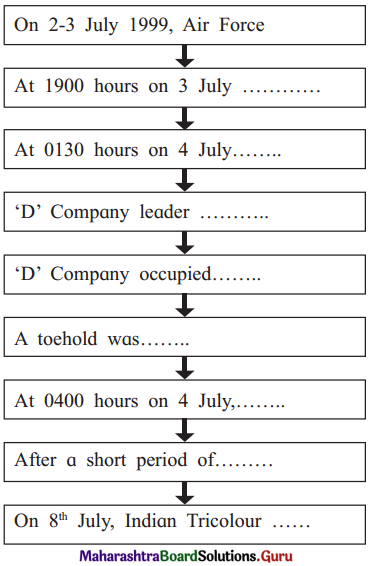
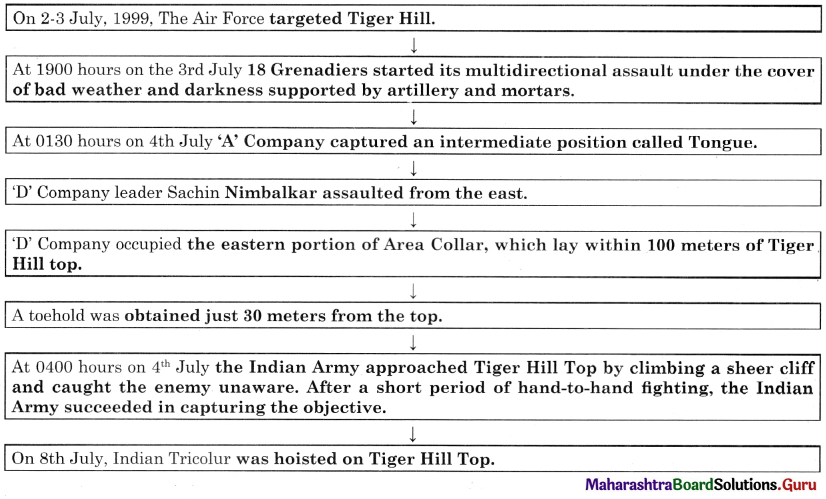 Question (vi)
Question (vi)